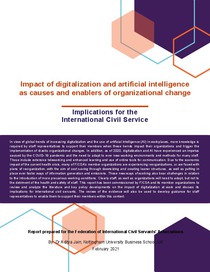Impact of digitalization and artificial intelligence as causes and enablers of organizational change: implications for the International Civil Service

University of Nottingham - Nottingham
2021
38 p.
digitalisation ; future of work ; artificial intelligence ; telework ; work organization ; social dialogue ; collective bargaining ; framework agreement ; civil service ; epidemic disease
Labour economics
English
Bibliogr.
"In view of global trends of increasing digitalization and the use of artificial intelligence (AI) in workplaces, more knowledge is required by staff representatives to support their members when these trends impact their organizations and trigger the implementation of drastic organizational changes. In addition, as of 2020, digitalization and AI have experienced an impetus caused by the COVID-19 pandemic and the need to adapt to ever new working environments and methods for many staff. Those include extensive teleworking and enhanced learning and use of online tools for communication. Due to the economic impact of the current health crisis, many of FICSA's member organizations are experiencing reorganizations, or are faced with plans of reorganization, with the aim of cost saving through downsizing and creating leaner structures, as well as putting in place ever faster ways of information generation and emissions. These new ways of working also bear challenges in relation to the introduction of more precarious working conditions. Clearly staff, as well as organizations will need to adapt, but not to the detriment of the health and safety of staff. This report has been commissioned by FICSA and its member organizations to review and analyze the literature and key policy developments on the impact of digitalization at work and discuss its implications for international civil servants. The review of the evidence will also be used to develop guidance for staff representatives to enable them to support their members within this context."
Digital
The ETUI is co-funded by the European Union. Views and opinions expressed are however those of the author(s) only and do not necessarily reflect those of the European Union or the ETUI.